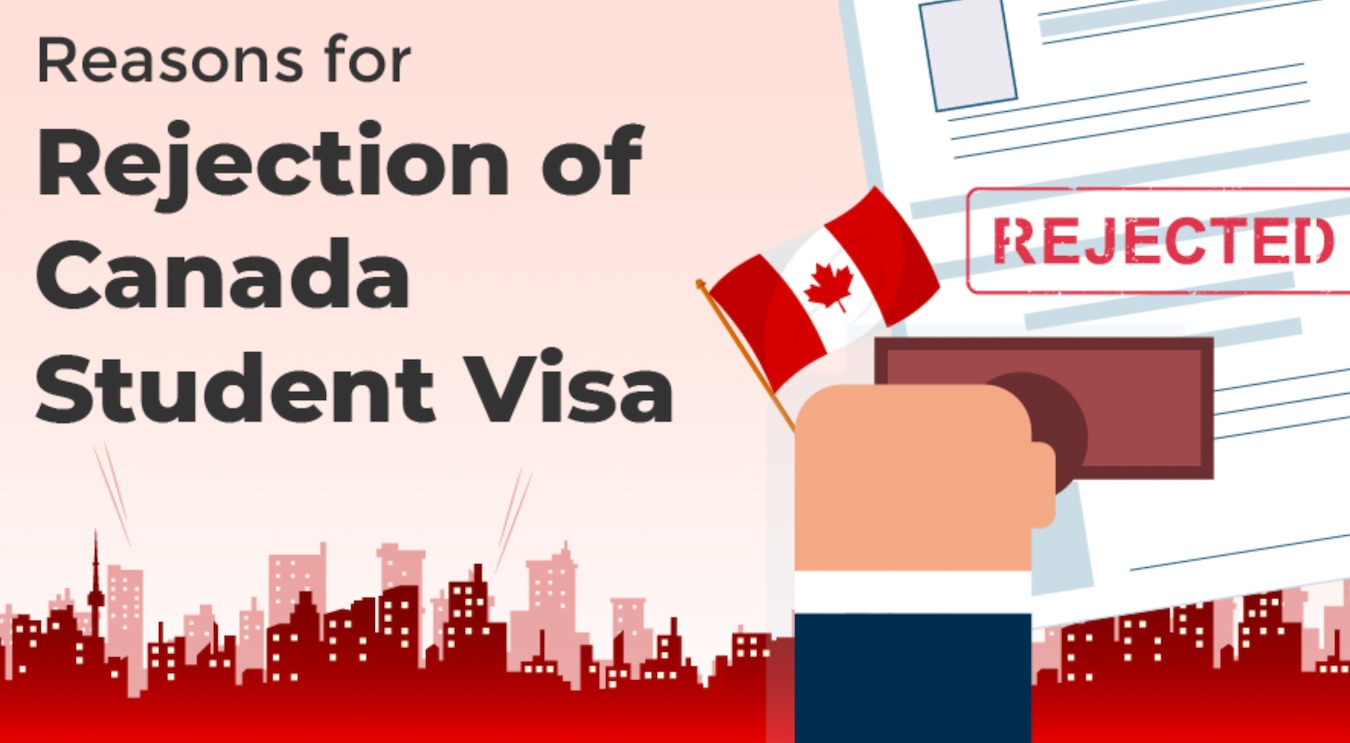Rejection of Canada Student Visa, A study indicates that 41% of employers are inclined to provide lucrative salaries to students who have pursued education abroad. As a result, millions of students from around the world choose sought-after study destinations to pursue their degrees. Canada stands out as a premier study destination, offering advanced and top-tier education programs to students from diverse geographical locations. Prospective international students aiming to study in Canada are required to obtain a study permit and a Canadian student visa for entry into the country.
The procedure for applying for and acquiring a Canadian student visa or study permit commences following the confirmation of admission to a Designated Learning Institute (DLI). According to Immigration, Refugees and Citizenship Canada (IRCC) records, approximately 640,000 international students currently possess student visas in Canada.
Every year witnesses a growth in the count of these visa holders. The surge in visa submissions has correspondingly resulted in a higher rate of rejections. The reported rejection rate for such visas stands at approximately 30% annually. International students must tackle various reasons behind the rejection of Canadian student visas to guarantee a seamless pursuit of their study abroad aspirations.
Top Reasons for Rejection of Canada Student Visa

The surge in the Rejection of Canada Student Visa rate can be attributed to the continually increasing popularity of Canadian universities. Given that the volume of applications surpasses the admission capacity of these institutions, even applicants with commendable academic records face rejections. Obtaining a visa approval in Canada proves to be notably challenging due to the high number of aspirants. It is crucial for students to identify the various reasons behind a rejected visa application to minimize the likelihood of refusal.
Given below are some of the most common reasons for the Rejection of Canada Student Visa:
1. Financial Instability
Officials assess your financial self-sufficiency and capability to cover a minimum of one year’s tuition at the college where you intend to enroll before issuing a study visa for Canada. If they determine that you can manage this without compromising your basic needs, they will approve the visa.
Successful applicants usually present financial documentation illustrating their capacity to sustain themselves in Canada for a specified duration without employment. However, they are not required to submit the essential financial documentation demonstrating that they possess sufficient funds to cover at least one year’s worth of tuition at the college to which they are applying.
In Canadian universities, tuition begins at $15,000 CAD. The government expects that students from other countries possess the financial resources to cover their tuition and associated expenses. Consequently, it demands credible evidence of financial stability. To address this, it is recommended not to focus solely on justifying the minimum required funds. Instead, applicants are advised to include proof of ample finances for more than one year and submit additional financial documentation with their application for a study permit in Canada.
2. Inadequate Identity or Travel Documents (including Lack of Travel History)
Visa officers hold the authority to reject your visa application in the absence of a comprehensive record of your travels or if your identity documents lack clarity. The visa officer will scrutinize your travel records to identify any problematic periods, should they suspect gaps in your travel history. To assess your eligibility for acceptance into Canada based on a medical condition or criminal conviction, visa authorities will authenticate your identity through the examination of your documentation.
Moreover, if you indicated on your study permit application form that you possess prior travel experience but lack adequate documentation to substantiate this assertion (such as a previous passport with visas or entry and exit stamps from the countries visited), your application may face denial. The reason being the insufficiency of documentation to support your claim.
It would be highly beneficial to substantiate your travel history with thorough documentation and evidence. Your identification documents should be clear and easy to comprehend. To facilitate the IRCC officer’s understanding of your online application, ensure that you organize your scanned documents chronologically.
3. Poor Academic Performance
Visa officers scrutinize educational records and assess academic consistency. They review the overall academic performance of the applicant. While good grades are crucial for approval, they are not the sole determinant. The acceptance or Rejection of Canada Student Visa is heavily influenced by English language proficiency test scores such as IELTS Exam and TOEFL Exam. Additionally, if there are inconsistencies in your academic records, it raises questions. International students should equip themselves with the support of counselors who can provide the best guidance on addressing such inconsistencies.
4. Intent to Return to Home Country
A student visa is a temporary permit with an expiration date. Therefore, visa officials seek confirmation that international students will return to their home country upon completing the course. Despite facing limited opportunities in their home countries, some international students might contemplate settling in Canada after finishing their studies. However, this inclination can serve as a reason for the rejection of a student visa application.
Hence, when the likelihood of returning to the home country is perceived as low, applications are promptly rejected. International students must express their eagerness to return home after completing the course both in the application form and during the visa interview. To secure visa approval, applicants also need to present compelling statements and documents outlining the significant job opportunities available in their home country.
5. Study program that is consistent with work experience and past qualifications
A student visa application might face rejection if the chosen specialization does not align with your previous qualifications and work experience. If the course you are seeking is not in harmony with your educational background and past work experience, it is crucial to provide a clear explanation for the change in your field of interest. Any statements or information in your application should be supported by valid proof.
6. Letter of acceptance
The Designated Learning Institute (DLI) must provide a letter of acceptance to each student upon admission. Every international student is required to submit this letter of acceptance from their respective DLI to the visa officials. In the event that students do not receive the letter of acceptance, the visa or study permit application is likely to be outright rejected. Along with the letter of acceptance, students must provide proof of meeting the minimum eligibility criteria as outlined by the Canadian government. Additional supporting personal documents or statements can also be included with the application form.
7. Choice of program
Visa officers meticulously assess whether your selected study program aligns with your future professional aspirations or your previous educational background (and work experience, if applicable). If they observe a sudden shift in your field of interest or area of study, they may raise concerns.
Common academic-related reasons for the rejection of Canada student visa:
- Applying for PG Diploma with very high GPA in Bachelors
- Applying for PG Diploma after Masters
- Career Gap
- Second Masters (non-MBA)
- Program not aligned with prior education (e.g. applying for Nursing program with an Engineering degree; or applying for Logistics & Supply Chain Management after working in the HR, Teaching, Accounts or Law sector).
There is no substitute for persuading the visa officials that it holds significance for you. To achieve this, include a comprehensive personal statement along with other documents related to your academic background. If you encounter a situation like this, remember that attention to detail is crucial.
Tips to Decrease the Chances of Canadian Student Visa Rejection

Here is some valuable information that will help you reduce the chances of your Canadian Student Visa rejection:
- Make a list of essential documents required to apply for a Canadian student visa.
- Fill the visa application form carefully and cross-check all the information.
- Make sure that you upload a copy of the offer letter that you received from a recognized Canadian university.
- If applied under the Student Partnership Program, the candidate must have the proof of finances.
- If you have relevant work experience, make sure that you submit your bank statements and salary slips as proof.
- Mention your travel history and visa rejections (if applicable) in the visa file.
- While applying online, make sure that you answer all the questions on the CIC website.
- Your statement of intent plays a crucial role in making the visa officer familiar with the candidate. So, make sure that you mention your academic achievements and your intent to study in Canada.
What to do if Student Visa is Rejected for Canada?
If your student visa application for Canada is rejected for any reason, you have the option to reapply, ensuring you learn from the mistakes made in your initial attempt. Here are some steps to guide you forward.
1. Figure out the reason behind the rejection of the Student Visa
There are various reasons for which your student visa may face rejection. It is essential to understand the specific reason in your case. Below are some common reasons for the rejection of Canadian student visas.
- Inadequate funds and lack of proof to support abroad education.
- False documents.
- If a candidate lacks language proficiency.
- If a candidate fails to confirm his immediate return to India after completing their education.
- The candidate does any misconduct during the visa interview process.
- Inability to justify the purpose of choosing a particular course, country, or university.
- Not being able to provide reasonable answers during the interview.
2. Rectify the problem
If you succeed in knowing the mistake that led to the rejection of your visa application, the next involves correcting that mistake.
| Mistake | How can you rectify it? |
| Lack of funds | Ensure that you have enough funds to support your education abroad |
| Wrong information | Mention the correct information before reapplying |
| Inability to state the purpose behind choosing a course, university or country | Make sure that you are fully aware about the course, university and country you’re applying into |
| Your answers lacked the ability to convince the visa officer. | Be clear about why you want to pursue higher education. Research about the facts of your country and practice your answers well. |
| If your intention of visiting the country was
not clear |
Ensure that you make a reliable impression on the visa officer about your aim of studying abroad. |
3. Re-Apply for Student Visa
When reapplying for a student visa, you have the option to apply to the same country. However, if you have faced multiple rejections from the same country, you may consider applying to another country. Let’s explore both possibilities.
a) Re-Apply in the Same Country
If your visa was rejected initially, there is a possibility of approval in the second attempt. Ensure that you avoid repeating the same mistakes that led to the initial rejection.
If you participated in a visa interview, you have the opportunity to inquire with the visa officer about the reasons for your rejection. However, if you were not required to undergo an interview, you should have received a document detailing the cause of your rejection. Once you understand the reason, ensure that you address the mistake before reapplying.
b) Try Applying for Other Countries
If a particular country consistently rejects your student visa applications, and you no longer wish to pursue applications there, you can explore alternative options by applying for visas in other countries that offer a similar quality of education.
Study in Canada with Canserves
As part of its mission to provide high-quality education at affordable rates, Canserves has introduced study abroad programs. These courses offer a flexible combination of online and on-campus learning in Canada, enabling students to substantially decrease their living expenses and other out-of-pocket costs. These programs come at approximately one-tenth of the cost of traditional on-campus courses, allowing students to save up to 80% on their tuition fees.
Frequently Asked Questions About Rejection of Canada Student Visa
Why do Canada student visas get rejected?
Several factors contribute to the rejection of a Canadian student visa. These include insufficient funds and a lack of evidence to support education abroad, submission of false documents, inadequate language skills, inappropriate behavior during the visa interview, failure to articulate reasons for selecting a specific course, university, and country, and an inability to confirm an immediate return to India after completing education.
Can I get a Canadian study visa after refusal?
Certainly, you have the opportunity to obtain a Canadian study visa even after a refusal by submitting a new application and ensuring you have all the necessary documents for the subsequent visa interview. Prior to reapplying, verify your financial situation and practice your responses for the interview.
What do Canadian visa officers check for student visas?
Canadian visa officers assess your ties to both Canada and your home country, examining factors such as family connections, employment status, immigration status, property ownership, and other aspects that bind you to your country of origin and to Canada. Additionally, visa officers consider your travel history and financial situation among other factors.
What can you do if your visa is rejected?
If your visa application is rejected, you have the option to reapply, ensuring you avoid repeating the mistakes that led to the initial denial. In the case of multiple rejections from the same country, you also have the choice to apply to another country.
What is the age limit for student visa in Canada?
In Canada, there is no upper age limit for admission to a university or obtaining a student visa. Universities may admit students of any age. However, the Immigration, Refugees and Citizenship Canada (IRCC), formerly known as CIC, may not grant a study permit to individuals of advanced age. To secure approval, individuals need to justify and convince the IRCC of the necessity and relevance of pursuing studies at an older age, especially after taking a break of several years since their last academic endeavor.
